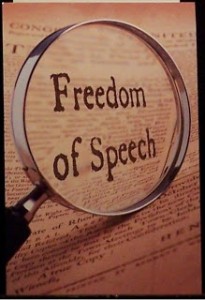 The US Constitution’s first ten amendments are called The Bill of Rights. The First Amendment limits the authority of government to enact laws impinging upon the natural rights of the people to practice religion, engage in speech, publish their ideas and assemble together to petition their government.
The US Constitution’s first ten amendments are called The Bill of Rights. The First Amendment limits the authority of government to enact laws impinging upon the natural rights of the people to practice religion, engage in speech, publish their ideas and assemble together to petition their government.
Freedom of religion is the first named freedom. The second named freedom, speech, has its roots in the philosophy underlying American government. The American concept of free speech grew from a convergence of Natural Law, individual sovereignty, the need for free and open discussion in Congress and the right to serve in Congress. When it was added to the Bill of Rights, American free speech was unlike any right that existed anywhere in the world. (The same can be said for the First Amendment’s three additional rights: press, assembly and petition for redress.)
The First Amendment’s Free Speech command:
“Congress shall make no law … abridging the freedom of speech …”
A Radical American Idea: Free Speech for Everyone
The Declaration of Independence’s references to the Laws of Nature[1] and Nature’s God demonstrate the importance of Natural Law[2] theory in the genesis of the United States. Individual sovereignty is a component of Natural Law.[3] This sovereignty is the underpinning of the legitimacy of the United States, and ultimately the right to free speech. At America’s founding the idea of free speech for the general population was a radical idea.
Freedom of Speech Historically Belonged to the Ruling Class
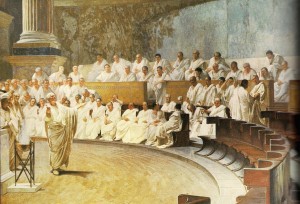 There are references to free speech through history. While Roman Senators exercised free speech in 5th Century BC, the Laws of the Twelve Tables[4] mention no right of free speech for the general population. Speech or expression through history followed this pattern. Ruling class speech received protections, but speech by the general population was subject to regulation by the ruling class.
There are references to free speech through history. While Roman Senators exercised free speech in 5th Century BC, the Laws of the Twelve Tables[4] mention no right of free speech for the general population. Speech or expression through history followed this pattern. Ruling class speech received protections, but speech by the general population was subject to regulation by the ruling class.
The English Bill of Rights of 1689
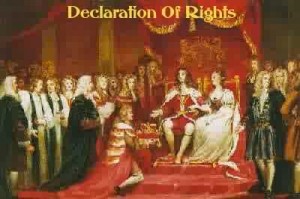 The English Bill of Rights of 1689 is sometimes referred to as inspiration for the United States Bill of Rights. Acceptance of this “Bill of Rights” was a condition to King William and Queen Mary becoming the rulers of England and placed limits on their authority. The “Bill” was a major step toward establishing Parliament’s supremacy and sovereignty. Though the English document shares a title with the US Constitution’s first ten amendments, the concepts embodied are worlds apart. Regarding free speech the 1689 English Bill of Rights provides:
The English Bill of Rights of 1689 is sometimes referred to as inspiration for the United States Bill of Rights. Acceptance of this “Bill of Rights” was a condition to King William and Queen Mary becoming the rulers of England and placed limits on their authority. The “Bill” was a major step toward establishing Parliament’s supremacy and sovereignty. Though the English document shares a title with the US Constitution’s first ten amendments, the concepts embodied are worlds apart. Regarding free speech the 1689 English Bill of Rights provides:
“That the freedom of speech and debates or proceedings in Parliament ought not to be impeached or questioned in any court or place out of Parliament”
This provision recognized free speech for members of Parliament. It did nothing for the King’s other subjects. As in ancient Rome, free speech belonged to the ruling class. The laws of seditious libel[5] and slander[6] fully protected the ruling class.
Truth Was no Defense to Slander or Seditious Libel in England
The 17th Century English law of slander provided for money damages in civil lawsuits for harm to another’s reputation. Criticism of a Member of Parliament was slander. The criticism’s truth did not matter. In fact, if a criticism were true, the damages awarded might be greater because a true damaging statement was thought to do more harm to a noble’s reputation than a false statement.
The English “Bill of Rights” did nothing for the free speech of commoners. They could be sent to jail or have their property taken for speech. This was the state of English law at the founding of the United States. There was no free speech.
The US Constitution’s “Speech or Debate” Clause
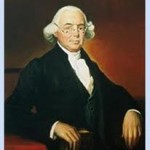 To promote free and open discussion of any issue that might come before the United States Congress, Article I, Section 6, Clause 1, of the U.S. Constitution states in part,
To promote free and open discussion of any issue that might come before the United States Congress, Article I, Section 6, Clause 1, of the U.S. Constitution states in part,
“…for any Speech or Debate in either House, [senators and representatives] shall not be questioned in any other place…”
The “Speech or Debate Clause” bears a striking resemblance to the 1689 English provision protecting members of Parliament. Unlike the British Parliament, the American Congress is neither sovereign, nor supreme. Members of Congress are elected by the People. The people retained their individual sovereignty and the rights to choose members of Congress, and the right to compete to become a member of Congress.
The historical lessons dating from the Roman Senate to Parliament’s 1689 Bill of Rights demonstrated the value of protecting legislators from either civil damages or criminal prosecution for statements made in the course of debating national laws. As James Wilson [7] put it:
“In order to enable and encourage a representative of the publick to discharge his publick trust with firmness and success, it is indispensably necessary, that he enjoy the fullest liberty of speech…”
Speech or Debate Clause Leads to American Freedom of Speech
In societies prior to the United States, power, wisdom and sovereignty flowed from the rulers of society, which imposed its will on the rest of the populace. In the philosophical design of the United States, power, wisdom and sovereignty lie with the people, who granted limited authority to the government. A congressman was to be no better than any other citizen, and any other citizen possessed the legal right to compete in the arena of ideas to become a congressman.
The Speech or Debate Clause was “indispensably necessary” to the conduct of congressional business. As every citizen could compete to be in Congress, it was also indispensably necessary that every citizen possess a comparable freedom.
If a citizen’s speech were not protected an untenable circumstance would arise. During an election, an incumbent Congressman could freely criticize his opponent. Absent restrictions on governmental interference with a private citizen’s speech, a citizen candidate could not criticize his opponent, the sitting Congressman, without fear of punishment. The broad coverage of American free speech sprung from the confluence of Natural Law, individual sovereignty, the need for free and open debate in Congress and the right to serve in Congress. Its origins were uniquely American.
American Free Speech Reverses the English Bill of Rights
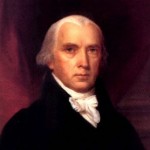 The English Bill of Rights gave Parliamentary speech protection and acknowledged the Supremacy and Sovereignty of Parliament. In the United States with the Founders commitment to a republican government, the purpose was just the opposite. James Madison was clear:
The English Bill of Rights gave Parliamentary speech protection and acknowledged the Supremacy and Sovereignty of Parliament. In the United States with the Founders commitment to a republican government, the purpose was just the opposite. James Madison was clear:
“If we advert to the nature of Republican Government, we shall find that the censorial power is in the people over the Government and not in the Government over the people.” [8]
Free Speech has Limits, but Its Origins Should Be Our Guide
Free Speech has never been without limits. In the classic example, one may not falsely yell fire in a crowded theater. There remain limits set by the civil law of libel and defamation. It is perjury to lie under oath in court. These are among the practical limits in a civil society.
The true roots of American Free Speech should not be forgotten. The Founders’ respect for Natural Law, personal sovereignty and liberty, and the principle that a government official should have no greater rights combined to limit government authority to interfere with the speech of any citizen.
[1] The Declaration’s opening paragraph:
“When in the Course of human events, it becomes necessary for one people to dissolve the political bands which have connected them with another, and to assume among the powers of the earth, the separate and equal station to which the Laws of Nature and of Nature’s God entitle them, a decent respect to the opinions of mankind requires that they should declare the causes which impel them to the separation.” (emphasis added)
[2] John Locke’s expositions of Natural Law were a major influence on America’s Founders. For Locke, Natural Law begins with the proposition that in a natural state, a human being owns himself and the products of his labor (property). Over these things, a human is naturally sovereign and possessor of natural rights. Humans voluntarily form governments to protect those rights, relinquishing elements of sovereignty. Because certain opinions might be destructive of society that humans had voluntarily joined, voicing such opinions was not necessarily protected and could be prohibited and punished by government. Though American free speech grew from Natural Law, it was not the direct product of Locke.
[3] Historically, “sovereignty” was the attribute of government to make and enforce law effective within the confines of a defined geography. Natural Law posits that all men in a state of nature are sovereign over themselves and that they consent to relinquish portions of that sovereignty to secure civil society’s protection of aspects of sovereignty (rights) that are retained, or in fact cannot be given up because they are inalienable.
[4] These laws outlined certain aspects of civil and criminal procedure for Rome, bearing some relation to a constitution, but the “constitution” of Rome was largely unwritten and composed of tradition references to speech rights are not to be found in the Twelve Tables.
[5] Seditious libel is criticism of the government, either oral or written, and a crime. In England, at the time of the American Revolution, punishment for seditious libel was potentially life in prison.
[6] Slander is an oral defamation or disparaging remark about someone told to one or more persons which harms the reputation of the person defamed. Slander may the basis of a civil lawsuit to recover money damages for the harm to reputation. As American law developed “slander” needed to be a false statement and truth became an absolute defense to civil damages. In 17th Century England it did not matter if a statement was false, only that it harmed another’s reputation.
[7] Wilson was among the few signers of both the Declaration of Independence and the Constitution. He was one of the six original members of the United States Supreme Court appointed by George Washington.
[8] It apparently was not so clear to members of the 5th Congress and President Adams. The Alien and Sedition Acts of 1798 made criticism of the government a federal crime, and resulted in many prominent Americans being jailed. Resistance to the laws resulted in some threats of secession and the famous Virginia and Kentucky Resolutions authored by Madison and Thomas Jefferson. (These resolutions stand as arguments today for the right of a state to nullify unconstitutional federal law) The election of 1800 turned into a referendum on the Acts and Adams was tossed from office. New President Jefferson pardoned those convicted under the Acts. The Acts expired by their own terms and no case ever reached the Supreme Court.






[…] First Amendment’s Free Speech Clause prohibits Congress from limiting the manner in which individuals express themselves. This not only […]